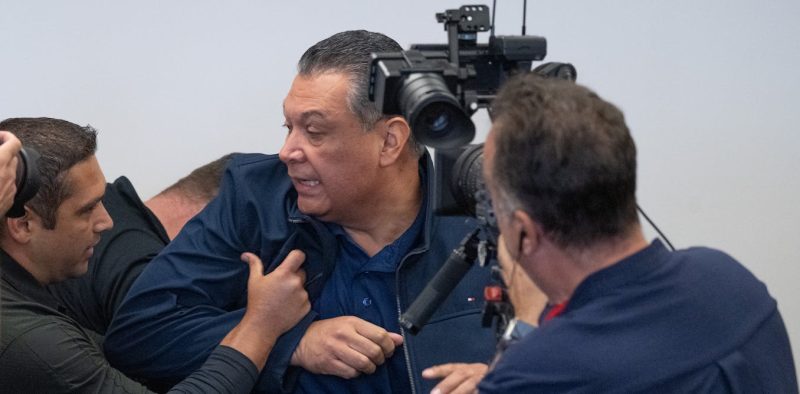
The forceful removal of Senator Alex Padilla from a press conference by Department of Homeland Security Secretary Kristi Noem’s security detail has sent shockwaves through American politics. The incident, captured on video, shows Senator Padilla being handcuffed and forcibly removed while shouting his identity and intent to ask a question. This brazen act, swiftly condemned by Democratic leaders and even a lone Republican Senator, Lisa Murkowski, has ignited a firestorm of debate about the state of American democracy and the balance of power between the executive and legislative branches.
The sheer aggressiveness of the removal is striking. Senator Padilla, representing 39 million Californians, was not some obscure House member; he’s a prominent Senator, and the manner of his removal is unprecedented in modern American history. The DHS’s subsequent claim that Padilla failed to identify himself is contradicted by the very video they shared, where his first words are clearly “I am Senator Alex Padilla.” This blatant disregard for a sitting Senator’s identity and rights speaks volumes about the current political climate.
Experts point to several contributing factors. Political scientist Charlie Hunt highlights the growing phenomenon of “negative partisanship,” where political loyalty is driven more by hatred for the opposing party than by genuine support for one’s own. This intense polarization fuels political violence and lowers the bar for acceptable political behavior. The incident with Senator Padilla is a stark example of this trend, a literal embodiment of the “beat the other side into submission” mentality.
The role of Donald Trump cannot be ignored. His past actions, including his encouragement of violence against protesters and his pardoning of January 6th rioters, have normalized a level of political aggression previously unthinkable. His rhetoric, painting political opponents as “sick” or “nasty,” has emboldened supporters to accept increasingly authoritarian actions by those in power.
The incident raises serious questions about the safeguards protecting members of Congress. While they enjoy basic free speech rights, they also possess oversight powers crucial for holding the executive branch accountable. Senator Padilla’s attempt to obtain clarity on immigration enforcement actions in Los Angeles was entirely within his legitimate purview. The Constitution’s speech and debate clause further protects Congress members from being punished for statements made in their official capacity. Yet, these protections seem to have been disregarded in this instance.
The long-term implications are deeply concerning. The erosion of the balance of power between the executive and legislative branches is a dangerous trend. Congress’s response to this incident will be telling. Will it assert its co-equal status, or will it continue its slow surrender of power to the executive? The coming days will reveal much about the future of American democracy. The contrasting responses of Senators Murkowski and Graham—one appalled, the other seemingly condoning the action—highlight the deep partisan divide and the uncertainty of the path ahead.
Images such as the one showing Senator Padilla speaking to reporters after his removal serve as powerful visual reminders of the gravity of this situation. This incident isn’t just about one Senator; it’s about the very foundations of our democratic system and the urgent need to address the factors that led to such an alarming event.










